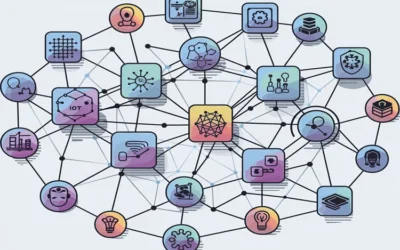Generative AI Transforms Marketing Teams and Strategy
- Generative AI unites strategy, creativity, and execution, enabling more agile and integrated marketing teams.
- Cultural change and upskilling are essential for successful AI integration in marketing.
- Hiring priorities shift toward curiosity, adaptability, and cross-functional collaboration in AI-driven organizations.
- Generative AI boosts marketing productivity by automating tasks and enabling deeper strategic focus.
- Long-term AI integration returns outweigh initial costs through scalability, efficiency, and innovation.
Generative AI transforms how marketing teams operate by eliminating traditional barriers between strategy, creativity, and technical execution. For CMOs, the challenge isn’t choosing between specialists and generalists—it’s creating integrated teams where human creativity amplifies AI-driven efficiency.
How AI Integration Reshapes Marketing Expertise
Marketing has long required balancing strategy, creativity, and technical skills across multiple disciplines. Scaling these capabilities presented consistent challenges. AI integration changes this dynamic by serving as a force multiplier rather than a replacement technology.
Consider predictive analytics: beyond identifying trends, these tools enable teams to convert insights into actionable campaigns with unprecedented speed. This acceleration creates more time for strategic thinking and creative development that resonates with target audiences. Research validates this transformation—83% of marketers report increased productivity since adopting AI, with nearly half saving 1-5 hours per week.
However, AI integration requires fundamental changes to team structure and workflows. Success depends on creating an environment where generative AI becomes a strategic advantage, not another tool competing for attention. McKinsey research shows that 71% of organizations now regularly use generative AI in at least one business function, with marketing and sales leading adoption.
AI-Driven Integration Challenges and Solutions
AI adoption presents specific hurdles that require strategic responses:
Change Management: Teams often resist new technologies because existing processes feel familiar and secure. Address this by implementing pilot projects that demonstrate immediate value. When teams see how AI tools simplify their work and improve outcomes, resistance transforms into enthusiasm.
Cultural Transformation: Success requires viewing AI integration as a collaborative partner rather than a threat. Build a culture that celebrates experimentation and continuous learning. When curiosity becomes embedded in daily operations, adopting new technologies feels like an opportunity rather than an obligation.
Skill Development: AI capabilities require investment in training and confidence-building. Provide hands-on learning opportunities and mentorship programs. Your direct involvement in their development demonstrates commitment and encourages teams to embrace challenges. Organizations with “very advanced” AI maturity see 75% of companies documenting their use cases, compared to just 22% at the beginning stage.
Strategic Talent Acquisition for AI-Driven Teams
Recruiting for AI-ready marketing roles requires balancing marketing expertise with technical adaptability.
Attracting Innovation-Minded Professionals: Top talent seeks organizations that prioritize innovation. Demonstrate your AI-driven commitment through hackathons, university partnerships, and showcasing challenging projects your teams tackle.
Retention Through Growth: Keep exceptional team members by providing opportunities to lead AI integration initiatives and own their successes. Autonomy increases engagement and long-term commitment.
Continuous Skill Development: Platforms like Coursera help close immediate skill gaps, but sustainable growth requires ongoing learning programs that keep teams current with evolving AI capabilities.
Investment Considerations and AI-Driven Returns
Generative AI integration involves significant upfront costs and adjustment periods as teams develop new workflows. However, strategic implementation delivers substantial returns through streamlined processes, reduced operational costs, and scalable marketing capabilities. Current market conditions validate this investment approach—84% of marketers report AI improved speed of delivering high-quality content, while 25.6% say AI-generated content outperforms manually created content.
Implementation Strategy:
- Acknowledge short-term challenges while maintaining focus on long-term benefits
- Establish clear milestones that demonstrate progress to teams and leadership
- Maintain strategic perspective on building AI capabilities that generate ongoing value
Practical AI Integration Framework
Transform your marketing organization through these strategic steps:
Strategic Hiring: Prioritize candidates who demonstrate curiosity and adaptability. Seek professionals who excel in collaborative, AI-driven environments.
Generative AI Integration: Deploy tools that automate repetitive tasks, allowing teams to focus on creative and strategic work that drives business impact. Research shows organizations are most often using generative AI in marketing and sales, product and service development, and service operations.
Role Evolution: Update position descriptions to include AI-driven proficiency requirements. Make cross-functional collaboration between marketing, IT, and data teams standard practice.
Balancing AI Capabilities with Human Strengths
Generative AI amplifies human capabilities rather than replacing them. Your role involves creating synergy where AI handles data processing and routine tasks while teams focus on empathy, creativity, and strategic thinking. The most mature marketing organizations don’t just adopt AI—they build the structures, processes, and strategies to scale it effectively, with 44% of CMOs rating their AI maturity as “advanced” compared to 27% of managers.
This combination builds marketing organizations prepared to lead in an AI-driven marketplace. The pressure for enhanced performance continues to intensify—leading CMOs are making the critical connection between operational excellence and customer experience, transforming internal workflows before attempting to revolutionize customer touchpoints.
The future belongs to marketing teams that harness generative AI’s computational power while maintaining the human insights that drive meaningful customer connections. This balance positions your organization not just to adapt to change, but to drive it through strategic AI integration that creates sustainable competitive advantages.
New Knowledge
AI Capabilities That Transform Marketing Teams
You’ll see why top marketing teams treat AI as a strategic partner, not a magic box, and how to align tools with business goals. (Reading time: 8 min)
Composable Thinking: Turning DXPs into Real Business Advantage
Discover how to bridge the technology-operations gap by adopting composable thinking, redesigning teams, and aligning governance to boost speed and ROI. (Reading time: 8 min)
Martech Optimization: Best Practices for Success
If you’re optimizing your martech stack without understanding how it drives customer value, you’re wasting budget and breaking systems. Learn how clarity fuels real growth. (Reading time: 6 min)
Marketing Ecosystem Transformation: From Stacks to Growth Engine
The Martech stack era is over—welcome to the ecosystem. Shift from siloed tools to a connected, modular approach that integrates workflows, improves ROI, and delivers seamless customer experiences. This guide explores building adaptable, scalable ecosystems. [Reading time: 6 min]






